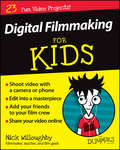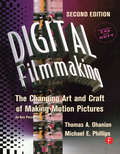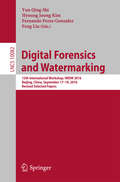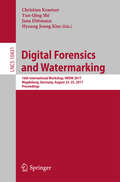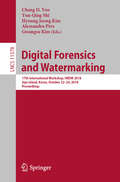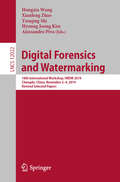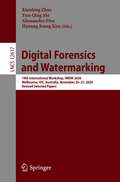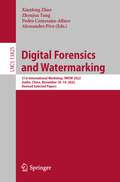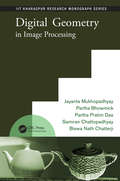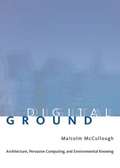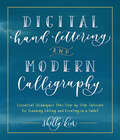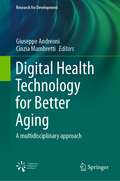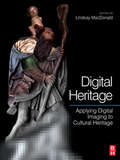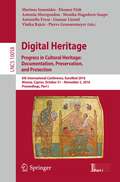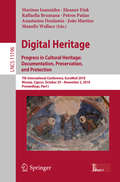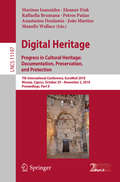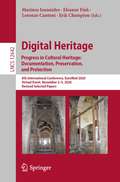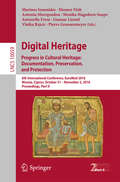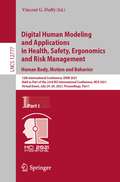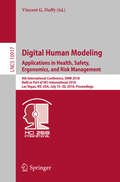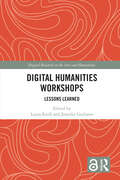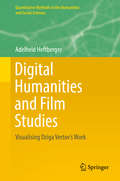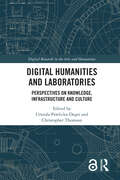- Table View
- List View
Digital Filmmaking For Kids For Dummies
by Nick WilloughbyThe easy way for kids to get started with filmmaking If you've been bitten by the filmmaking bug--even if you don't have a background in video or access to fancy equipment--Digital Filmmaking For Kids makes it easy to get up and running with digital filmmaking! This fun and friendly guide walks you through a ton of cool projects that introduce you to all stages of filmmaking. Packed with full-color photos, easy-to-follow instruction, and simple examples, it shows you how to write a script, create a storyboard, pick a set, light a scene, master top-quality sound, frame and shoot, edit, add special effects, and share your finished product with friends or a global audience. Anyone can take a selfie or upload a silly video to YouTube--but it takes practice and skill to shoot professional-looking frames and make your own short film. Written by a film and video professional who has taught hundreds of students, this kid-accessible guide provides you with hands-on projects that make it fun to learn all aspects of video production, from planning to scripting to filming to editing. Plus, it includes access to videos that highlight and demonstrate skills covered in the book, making learning even easier and less intimidating to grasp. Create a film using the tools at hand Plan, script, light and shoot your video Edit and share your film Plan a video project from start to finish If you're a student aged 7-16 with an interest in creating and sharing your self-made video, this friendly guide lights the way for your start in digital filmmaking.
Digital Filmmaking: The Changing Art and Craft of Making Motion Pictures
by Thomas Ohanian Natalie PhillipsDigital Filmmaking has been called the bible for professional filmmakers in the digital age. It details all of the procedural, creative, and technical aspects of pre-production, production, and post-production within a digital filmmaking environment. It examines the new digital methods and techniques that are redefining the filmmaking process, and how the evolution into digital filmmaking can be used to achieve greater creative flexibility as well as cost and time savings. The second edition includes updates and new information, including four new chapters that examine key topics like digital television and high definition television,making films using digital video, 24 P and universal mastering, and digital film projection. Digital Filmmaking provides a clear overview of the traditional filmmaking process, then goes on to illuminate the ways in which new methods can accomplish old tasks. It explains vital concepts, including digitization, compression, digital compositing, nonlinear editing, and on-set digital production and relates traditional film production and editing processes to those of digital techniques. Various filmmakers discuss their use of digital techniques to enhance the creative process in the "Industry Viewpoints" sections in each chapter .
Digital Forensics and Watermarking
by Feng Liu Hyoung Joong Kim Yun Qing Shi Fernando Perez-GonzalezThis book constitutes revised selected papers from the 14th International Workshop on Digital-Forensics and Watermarking, IWDW 2015, held in Tokyo, Japan, in October 2015. The 35 papers presented in this volume were carefully reviewed and selected from 54 submissions. The contributions are organized in topical sections named: digital forensics; steganography and steganalysis; digital watermarking; reversible data hiding; and visual cryptography.
Digital Forensics and Watermarking: 15th International Workshop, IWDW 2016, Beijing, China, September 17-19, 2016, Revised Selected Papers (Lecture Notes in Computer Science #10082)
by Yun Qing Shi, Hyoung Joong Kim, Fernando Perez-Gonzalez and Feng LiuThis book constitutes the revised post-conference proceedings of the 15th International Workshop on Digital Forensics and Watermarking, IWDW 2016, held in Beijing, China, in September 2016.The 45 papers presented in this volume were carefully reviewed and selected from 70 submissions. The contributions are organized in topical sections on digital forensics, visual cryptography, reversible data hiding, and steganography and steganalysis.
Digital Forensics and Watermarking: 16th International Workshop , IWDW 2017, Magdeburg, Germany, August 23-25, 2017, Proceedings (Lecture Notes in Computer Science #10431)
by Christian Kraetzer, Yun-Qing Shi, Jana Dittmann and Hyoung Joong KimThis book constitutes the refereed proceedings of the 16th International Workshop on Digital Forensics and Watermarking, IWDW 2017, held in Magdeburg, Germany, in August 2017. The 30 papers presented in this volume were carefully reviewed and selected from 48 submissions. The contributions are covering the state-of-the-art theoretical and practical developments in the fields of digital watermarking, steganography and steganalysis, forensics and anti-forensics, visual cryptography, and other multimedia-related security issues. Also included are the papers on two special sessions on biometric image tampering detection and on emerging threats of criminal use of information hiding : usage scenarios and detection approaches.
Digital Forensics and Watermarking: 17th International Workshop, IWDW 2018, Jeju Island, Korea, October 22-24, 2018, Proceedings (Lecture Notes in Computer Science #11378)
by Yun-Qing Shi Hyoung Joong Kim Alessandro Piva Chang D. Yoo Gwangsu KimThis book constitutes the refereed proceedings of the 17th International Workshop on Digital Forensics and Watermarking, IWDW 2018, held on Jeju Island, Korea, in October 2018.The 25 papers presented in this volume were carefully reviewed and selected from 43 submissions. The contributions are covering the following topics: deep neural networks for digital forensics; steganalysis and identification; watermarking; reversible data hiding; steganographic algorithms; identification and security; deep generative models for forgery and its detection.
Digital Forensics and Watermarking: 18th International Workshop, IWDW 2019, Chengdu, China, November 2–4, 2019, Revised Selected Papers (Lecture Notes in Computer Science #12022)
by Hyoung Joong Kim Alessandro Piva Hongxia Wang Xianfeng Zhao Yunqing ShiThe 22 full papers and 12 shorts papers presented in this volume were carefully reviewed and selected from 70 submissions. The contributions are covering the following topics: deep learning for multimedia security; digital forensics and anti-forensics; digital watermarking; information hiding; steganography and steganalysis; authentication and security.
Digital Forensics and Watermarking: 19th International Workshop, IWDW 2020, Melbourne, VIC, Australia, November 25–27, 2020, Revised Selected Papers (Lecture Notes in Computer Science #12617)
by Yun-Qing Shi Hyoung Joong Kim Alessandro Piva Xianfeng ZhaoThis volume constitutes the proceedings of the 19th International Workshop on Digital Forensics and Watermarking, IWDW 2020, held in Melbourne, VIC, Australia, in November 2020.The 20 full papers in this volume were carefully reviewed and selected from 43 submissions. They cover topics such as: novel research, development and application of digital watermarking and forensics techniques for multimedia security.
Digital Forensics and Watermarking: 21st International Workshop, IWDW 2022, Guilin, China, November 18-19, 2022, Revised Selected Papers (Lecture Notes in Computer Science #13825)
by Alessandro Piva Xianfeng Zhao Pedro Comesaña-Alfaro Zhenjun TangThis book constitutes the refereed proceedings of the 21st International Workshop, IWDW 2022, held in Guilin, China, during November 18-19, 2022. The 14 full papers included in this book were carefully reviewed and selected from 30 submissions. They were organized in topical sections as follows: Steganology, Forensics and Security Analysis, Watermarking.
Digital Geometry in Image Processing
by Samiran Chattopadhyay Jayanta Mukhopadhyay Partha Pratim Das Partha Bhowmick Biswa Nath ChatterjiExploring theories and applications developed during the last 30 years, Digital Geometry in Image Processing presents a mathematical treatment of the properties of digital metric spaces and their relevance in analyzing shapes in two and three dimensions. Unlike similar books, this one connects the two areas of image processing and digital geometry,
Digital Ground: Architecture, Pervasive Computing, and Environmental Knowing
by Malcom McclloughDigital Ground is an architect's response to the design challenge posed by pervasive computing. One century into the electronic age, people have become accustomed to interacting indirectly, mediated through networks.
Digital Hand Lettering and Modern Calligraphy: Essential Techniques Plus Step-by-Step Tutorials for Scanning, Editing, and Creating on a Tablet
by Shelly KimFor lettering enthusiasts of all levels, learn easy ways to develop and adapt hand lettering skills and techniques to a variety of digital platforms.Popular Instagram lettering artist and workshop instructor Shelly Kim (@lettersbyshells) offers lettering artists from beginner to advanced step-by-step instruction, along with ample photos and lettering examples. Start with lettering essentials that show how to create different styles of brush lettering with the right tools, how to connect letters to form words, form flourishes, and more.Then turn that unique calligraphy into lettering that you can use over and over again, just by digitizing it. Discover several options for creating digital lettering, each one clearly outlined and explained. Become familiar with tools and techniques that make the process fast and enjoyable.See how far you can take your digital lettering with fun projects for creating cards, name tags, adding foiling and more.In this book you’ll learn how to:Produce loose, bouncy lettering that adds style to any projectDesign meaningful quotes by learning a quick trick for great compositionsCreate digital files that give you numerous options for adding color and changing the shapes and sizes of lettersMake a custom digital lettering brush that you can use for unique calligraphyLetter on a tablet and learn the basics of Procreate and Apple PencilUse your lettering for great projects that incorporate digital and hands-on techniquesGet inspiration from stunning gallery pieces by Karin Newport of @ipadlettering and Myriam of @halfapxDigital Hand Lettering and Modern Calligraphy will guide you to the future of lettering!
Digital Health Technology for Better Aging: A multidisciplinary approach (Research for Development)
by Giuseppe Andreoni Cinzia MambrettiThis book describes the multidisciplinary approach needed to tackle better aging. Aging populations are one of the 21st century’s biggest challenges. National health systems are forced to adapt in order to provide adequate and affordable care. Innovation, driven by digital technology, is a key to improving quality of life and encouraging healthy living. Well-designed technology keeps people empowered, independent, and mobile; however, despite widespread adoption of ICT in day-to-day life, digital health technologies have yet to catch on. To this end, technology needs to be effective, usable, cheap, and designed to ensure the security of the managed data. In the era of mHealth, mobile technology, and social design, this book describes, in six sections, the collaboration of polytechnic know-how and social science and health sectors in the creation of a system for encouraging people to engage in healthy behavior and achieve a better quality of life.
Digital Heritage
by Lindsay MacDonaldIn the fields of documentation and conservation of cultural heritage assets, there is a constant need for higher quality records and better analytical tools for extracting information about the condition of artefacts. Digital photography and digital image processing provide these capabilities, and recent technological advances in both fields promise new levels of performance for the capture and understanding of colour images. This inter-disciplinary book covers the imaging of decorated surfaces in historical buildings and the digitisation of documents, paintings and objects in museums and galleries, and shows how user requirements can be met by application of powerful digital imaging techniques. Numerous case studies illustrate the methods.
Digital Heritage. Progress in Cultural Heritage: 6th International Conference, EuroMed 2016, Nicosia, Cyprus, October 31 – November 5, 2016, Proceedings, Part I (Lecture Notes in Computer Science #10058)
by Gunnar Liestøl Antonella Fresa Marinos Ioannides Eleanor Fink Antonia Moropoulou Monika Hagedorn-Saupe Vlatka Rajcic Pierre GrussenmeyerThis two-volume set LNCS 10058 and LNCS 10059 constitutes the refereed proceedings of the 6th International Conference on Digital Heritage, EuroMed 2016, held in Nicosia, Cyprus, in October/November 2016. The 29 full papers, 44 project papers, and 32 short papers presented were carefully reviewed and selected from 502 submissions. The papers are organized in topical sections on 3D Reconstruction and 3D Modelling; Heritage Building Information Models; Innovative Methods on Risk Assesment, Monitoring and Protection of Cultural Heritage; Intangible Cultural Heritage Documentation; Digital Applications for Materials' Preservation and Conservation in Cultural Heritage; Non-Destructive Techniques in Cultural Heritage Conservation; Visualisation, VR and AR Methods and Applications; The New Era of Museums and Exhibitions: Digital Engagement and Dissemination; Digital Cultural Heritage in Education, Learning and Training; Data Acquisition, Process and Management in Cultural Heritage; Data, Metadata, Semantics and Ontologies in Cultural Heritage; Novel Approaches to Landscapes in Cultural Heritage; Digital Applications for Materials' Preservation and Conservation in Cultural Heritage; and Serious Games for Cultural Heritage.
Digital Heritage. Progress in Cultural Heritage: 6th International Conference, Euromed 2016, Nicosia, Cyprus, October 31 - November 5, 2016, Proceedings, Part I (Lecture Notes in Computer Science #10058)
by Marinos Ioannides Eleanor Fink João Martins Raffaella Brumana Petros Patias Anastasios Doulamis Manolis WallaceThis two-volume set LNCS 11196 and LNCS 11197 constitutes the refereed proceedings of the 7th International Conference on Digital Heritage, EuroMed 2018, held in Nicosia, Cyprus, in October/November 2018. The 21 full papers, 47 project papers, and 29 short papers presented were carefully reviewed and selected from 537 submissions. The papers are organized in topical sections on 3D Digitalization, Reconstruction, Modeling, and HBIM; Innovative Technologies in Digital Cultural Heritage; Digital Cultural Heritage –Smart Technologies; The New Era of Museums and Exhibitions; Digital Cultural Heritage Infrastructure; Non Destructive Techniques in Cultural Heritage Conservation; E-Humanities; Reconstructing the Past; Visualization, VR and AR Methods and Applications; Digital Applications for Materials Preservation in Cultural Heritage; and Digital Cultural Heritage Learning and Experiences.
Digital Heritage. Progress in Cultural Heritage: 6th International Conference, Euromed 2016, Nicosia, Cyprus, October 31 - November 5, 2016, Proceedings, Part I (Lecture Notes in Computer Science #10058)
by Marinos Ioannides Eleanor Fink João Martins Raffaella Brumana Petros Patias Anastasios Doulamis Manolis WallaceThis two-volume set LNCS 11196 and LNCS 11197 constitutes the refereed proceedings of the 7th International Conference on Digital Heritage, EuroMed 2018, held in Nicosia, Cyprus, in October/November 2018. The 21 full papers, 47 project papers, and 29 short papers presented were carefully reviewed and selected from 537 submissions. The papers are organized in topical sections on 3D Digitalization, Reconstruction, Modeling, and HBIM; Innovative Technologies in Digital Cultural Heritage; Digital Cultural Heritage –Smart Technologies; The New Era of Museums and Exhibitions; Digital Cultural Heritage Infrastructure; Non Destructive Techniques in Cultural Heritage Conservation; E-Humanities; Reconstructing the Past; Visualization, VR and AR Methods and Applications; Digital Applications for Materials Preservation in Cultural Heritage; and Digital Cultural Heritage Learning and Experiences.
Digital Heritage. Progress in Cultural Heritage: 8th International Conference, EuroMed 2020, Virtual Event, November 2–5, 2020, Revised Selected Papers (Lecture Notes in Computer Science #12642)
by Erik Champion Marinos Ioannides Eleanor Fink Lorenzo CantoniThis book constitutes the refereed post-conference proceedings of the 8th International Conference on Digital Heritage, EuroMed 2020, held virtually in November 2020.The 37 revised project papers and 30 revised short papers presented were carefully reviewed and selected from 326 submissions. The papers are on topics such as digital data acquisition technologies in CH/2D and 3D data capture methodologies and data processing; remote sensing for archaeology and cultural heritage management and monitoring; interactive environments and applications; reproduction techniques and rapid prototyping in CH; e-Libraries and e-Archives in cultural heritage; virtual museum applications (e-Museums and e-Exhibitions); visualisation techniques (desktop, virtual and augmented reality); storytelling and authoring tools; tools for education; 2D and 3D GIS in cultural heritage; and on-site and remotely sensed data collection.
Digital Heritage. Progress in Cultural Heritage: Documentation, Preservation, and Protection
by Gunnar Liestøl Antonella Fresa Marinos Ioannides Eleanor Fink Antonia Moropoulou Monika Hagedorn-Saupe Vlatka Rajcic Pierre GrussenmeyerThis two-volume set LNCS 10058 and LNCS 10059 constitutes the refereed proceedings of the 6th International Conference on Digital Heritage, EuroMed 2016, held in Nicosia, Cyprus, in October/November 2016. The 29 full papers, 44 project papers, and 32 short papers presented were carefully reviewed and selected from 502 submissions. The papers are organized in topical sections on 3D Reconstruction and 3D Modelling; Heritage Building Information Models; Innovative Methods on Risk Assesment, Monitoring and Protection of Cultural Heritage; Intangible Cultural Heritage Documentation; Digital Applications for Materials' Preservation and Conservation in Cultural Heritage; Non-Destructive Techniques in Cultural Heritage Conservation; Visualisation, VR and AR Methods and Applications; The New Era of Museums and Exhibitions: Digital Engagement and Dissemination; Digital Cultural Heritage in Education, Learning and Training; Data Acquisition, Process and Management in Cultural Heritage; Data, Metadata, Semantics and Ontologies in Cultural Heritage; Novel Approaches to Landscapes in Cultural Heritage; Digital Applications for Materials' Preservation and Conservation in Cultural Heritage; and Serious Games for Cultural Heritage.
Digital Heritage. Progress in Cultural Heritage: Documentation, Preservation, and Protection
by Gunnar Liestøl Antonella Fresa Marinos Ioannides Eleanor Fink Antonia Moropoulou Monika Hagedorn-Saupe Vlatka Rajcic Pierre GrussenmeyerThis two-volume set LNCS 10058 and LNCS 10059 constitutes the refereed proceedings of the 6th International Conference on Digital Heritage, EuroMed 2016, held in Nicosia, Cyprus, in October/November 2016. The 29 full papers, 44 project papers, and 32 short papers presented were carefully reviewed and selected from 502 submissions. The papers are organized in topical sections on 3D Reconstruction and 3D Modelling; Heritage Building Information Models; Innovative Methods on Risk Assesment, Monitoring and Protection of Cultural Heritage; Intangible Cultural Heritage Documentation; Digital Applications for Materials' Preservation and Conservation in Cultural Heritage; Non-Destructive Techniques in Cultural Heritage Conservation; Visualisation, VR and AR Methods and Applications; The New Era of Museums and Exhibitions: Digital Engagement and Dissemination; Digital Cultural Heritage in Education, Learning and Training; Data Acquisition, Process and Management in Cultural Heritage; Data, Metadata, Semantics and Ontologies in Cultural Heritage; Novel Approaches to Landscapes in Cultural Heritage; Digital Applications for Materials' Preservation and Conservation in Cultural Heritage; and Serious Games for Cultural Heritage.
Digital Human Modeling and Applications in Health, Safety, Ergonomics and Risk Management. Human Body, Motion and Behavior: 12th International Conference, DHM 2021, Held as Part of the 23rd HCI International Conference, HCII 2021, Virtual Event, July 24–29, 2021, Proceedings, Part I (Lecture Notes in Computer Science #12777)
by Vincent G. DuffyThis two-volume set LNCS 12777 and 12778 constitutes the thoroughly refereed proceedings of the 12th International Conference on Digital Human Modeling and Applications in Health, Safety, Ergonomics and Risk Management, DHM 2021, which was held virtually as part of the 23rd HCI International Conference, HCII 2021, in July 2021.The total of 1276 papers and 241 posters included in the 39 HCII 2021 proceedings volumes was carefully reviewed and selected from 5222 submissions. DHM 2021 includes a total of 56 papers; they were organized in topical sections named: Part I, Human Body, Motion and Behavior: Ergonomics, human factors and occupational health; human body and motion modeling; and language, communication and behavior modeling. Part II, AI, Product and Service: Rethinking healthcare; artificial intelligence applications and ethical issues; and digital human modeling in product and service design.
Digital Human Modeling. Applications in Health, Safety, Ergonomics, and Risk Management: 9th International Conference, DHM 2018, Held as Part of HCI International 2018, Las Vegas, NV, USA, July 15-20, 2018, Proceedings (Lecture Notes in Computer Science #10917)
by Vincent G. DuffyThis book constitutes the refereed proceedings of the 9th International Conference on Digital Human Modeling and Applications in Health, Safety, Ergonomics, and Risk Management, DHM 2018, held as part of HCI International 2018 in Las Vegas, NV, USA. HCII 2018 received a total of 4346 submissions, of which 1171 papers and 160 posters were accepted for publication after a careful reviewing process. The 53 papers presented in this volume were organized in topical sections as follows: Anthropometry, ergonomics and design; Motion modelling and rehabilitation; User diversity and well-being; Nursing and medical applications; Transportation human factors.
Digital Humanities Workshops: Lessons Learned (Digital Research in the Arts and Humanities)
by Jennifer Guiliano Laura EstillDigital Humanities Workshops is the first volume to focus explicitly on the most common and accessible kind of training in digital humanities (DH): workshops. Drawing together the experiences and expertise of dozens of scholars and practitioners from a variety of disciplines and geographical contexts, the chapters in this collection examine the development, deployment, and assessment of a workshop or workshop series. In the first section, "Where?", the authors seek to situate digital humanities workshops within local, regional, and national contexts. The second section, "Who?", guides readers through questions of audience in relation to digital humanities workshops. In the third and final section, "How?", authors explore the mechanics of such workshops. Taken together, the chapters in this volume answer the important question: why are digital humanities workshops so important and what is their present and future role? Digital Humanities Workshops examines a range of digital humanities workshops and highlights audiences, resources, and impact. This volume will appeal to academics, researchers and postgraduate students, as well as professionals working in the DH field.
Digital Humanities and Film Studies: Visualising Dziga Vertov's Work (Quantitative Methods in the Humanities and Social Sciences)
by Adelheid HeftbergerThis book highlights the quantitative methods of data mining and information visualization and explores their use in relation to the films and writings of the Russian director, Dziga Vertov. The theoretical basis of the work harkens back to the time when a group of Russian artists and scholars, known as the “formalists,” developed new concepts of how art could be studied and measured. This book brings those ideas to the digital age. One of the central questions the book intends to address is, “How can hypothetical notions in film studies be supported or falsified using empirical data and statistical tools?” The first stage involves manual and computer-assisted annotation of the films, leading to the production of empirical data which is then used for statistical analysis but more importantly for the development of visualizations. Studies of this type furthermore shed light on the field of visual presentation of time-based processes; an area which has its origin in the Russian formalist sphere of the 1920s and which has recently gained new relevance due to technological advances and new possibilities for computer-assisted analysis of large and complex data sets. In order to reach a profound understanding of Vertov and his films, the manual or computer-assisted data analysis must be combined with film-historical knowledge and a study of primary sources. In addition, the status of the surviving film materials and the precise analysis of these materials combined with knowledge of historical film technology provide insight into archival policy and political culture in the Soviet Union in the 1920s and 30s.
Digital Humanities and Laboratories: Perspectives on Knowledge, Infrastructure and Culture (Digital Research in the Arts and Humanities)
by Urszula Pawlicka-Deger Christopher ThomsonDigital Humanities and Laboratories explores laboratories dedicated to the study of digital humanities (DH) in a global context and contributes to the expanding body of knowledge about situated DH knowledge production. Including contributions from a diverse, international range of scholars and practitioners, this volume examines the ways laboratories of all kinds contribute to digital research and pedagogy. Acknowledging that they are emerging amid varied cultural and scientific traditions, the volume considers how they lead to the specification of digital humanities and how a locally situated knowledge production is embedded in the global infrastructure system. As a whole, the book consolidates the discussion on the role of the laboratory in DH and brings digital humanists into the interdisciplinary debate concerning the notion of a laboratory as a critical site in the generation of experimental knowledge. Positioning the discussion in relation to ongoing debates in DH, the volume argues that laboratory studies are in an excellent position to capitalize on the theories and knowledge developed in the DH field and open up new research inquiries. Digital Humanities and Laboratories clearly demonstrates that the laboratory is a key site for theoretical and critical analyses of digital humanities and will thus be of interest to scholars, students and practitioners engaged in the study of DH, culture, media, heritage and infrastructure.
